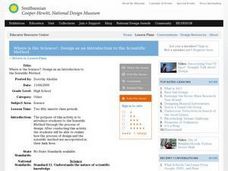Physics Classroom
Color Pigments
Objects contain pigments that selectively absorb a wavelength of light, and our eyes only observe a very small range of these wavelengths. Scholars apply these two facts to three different activities. They identify the pigment in an...
Physics Classroom
Spectrum
Scholars relate each of the colors in the spectrum, except indigo, by comparing their frequencies, wavelengths, and energy levels. Then, they compare each section of the electromagnetic spectrum when considering the same three variables.
Curated OER
Reptiles Vocabulary Multiple Choice Activity
For this reptiles vocabulary worksheet, students complete a ten question multiple choice activity pertaining to reptiles. Students read the questions and choose the correct answer from four choices.
Curated OER
Far-out Astronomy in a Suitcase
Ninth graders engage in a web-based research activity. They use a teacher provided worksheet to guide their research through the website. This lesson provide a excellent opportunity to showcase Canadians astronomy and space science...
Curated OER
Ray Multiple Choice Activity
In this ray activity, students complete a ten question multiple choice activity pertaining to sea rays. Prior knowledge is assumed.
Curated OER
Up in the Air
Students evaluate the impact of volcanic ash on the surroundin environment. Through discussion, videos and activities, they identify the various ways in which volcanic ash can be more detrimental than volcanic magma and lava.
Curated OER
Epic Improvisation
Really? Rapping The Odyssey? Really. A discussion of the oral tradition of story telling and its links to Epic poetry sets the stage for a series of activities that encourage improvisation to integrate music into other classrooms....
National Park Service
Hibernation-Migration-Fascination
What's the difference between hibernation and a good nap? Find out with an engaging life science activity that compares the hibernation habits of grizzly bears and marmots. After learners read an informational passage about each mammal,...
University of Georgia
Monohybrid Crosses and The Punnett Square Lesson Plan
Looking for a quick, hands-on activity to teach young scientists about Punnett squares through monohybrid crosses? then check out this one.
Exploratorium
Cardboard Tube Syllabus
Construct paper tubes and then try out a few optical illusion tricks:
See a virtual hole in your own hand
Get a grasp of how the eyes combine images
Notice that one eye is dominant over the other
Reveal how your eyes adjust to...
National Park Service
Who Grows There?
More than 127 non-native species live in Glacier National Park in Montana and their infestations are growing! Pupils read about and gather samples of exotic plants. Participants create a master book of pressed plants and complete a...
National Institute of Open Schooling
Solid State
Crystal comes from a Greek word meaning ice. Activity eight in a series of 36 has class members analyzing amorphous and crystalline solids and further classifying them based on their forces. They then explore solids, learning about unit...
Curated OER
The Big Circle
Students explore geography by participating in a mapping activity. In this concentric ring lesson, students utilize a poster board, string and markers to identify their current location within the entire world. Students write about their...
Curated OER
Close Encounters
Students investigate the cause of death of a fictitious school janitor. They develop hypotheses based on information discovered by examining the labels of household chemicals.
Curated OER
Seeing and Feeling Sound Vibrations
Groups rotate through a series of stations and work with a partner to observe sound waves. Children describe sound in terms of pitch, volume, and frequency. To apply their new knowledge, the class considers how these observations can...
Code.org
Star Wars: Building a Galaxy with Code
Welcome to the code side. The interactive lesson introduces coding in a game format with familiar characters. Young computer experts learn to develop code to control the interaction of the characters in the game. The activity ends with...
Consortium for Ocean Science Exploration and Engagement (COSEE)
Plankton to Penguins: Antarctic Food Web
A well-written lesson plan, second in a series of four, gets high schoolers exploring how the Antarctic food web is impacted by climate change and the associated melting of polar ice sheets. It begins with a PowerPoint presentation about...
Teach Engineering
Cartesian Diver
Amaze your scholars with an activity that uses a Cartesian diver to demonstrate Pascal's Law, Archimedes' Principle, and the Ideal Gas Law. Groups then repeat the process and make their own diver move up and down in a bottle.
Earth Day Network
Filtering Water
See the water filtration system up close with a fun science experiment. Young scientists work for several class periods to design a water filter using household objects, and then decide which filter material would be most effective in...
Teach Engineering
Quantum Dots and the Harkess Method
The Fantastic Voyage is becoming close to reality. The class reads an article on the use of nanotechnology in the medical field and participate in a discussion about what they read. The discussion method helps class members become more...
Teach Engineering
Close Encounters of the Polymer Kind
A PowerPoint presents features of polymers and two of its categories (thermoplastics and thermosets). Instructors conduct demonstrations to illustrate the Weissenberg Effect and the Barus & Kaye Effects of polymers in the first of...
Curated OER
Where is the Science?: Design as an Introduction to the Scientific Method
Students work to create a design that will protect an egg from being dropped from a one story floor. They test their prototype after it is completed. They write clear instructions and link aspects of the design process to the scientific...
Curated OER
Applied Science - Science and Math Lab
Learners investigate topology. For this Applied Science lesson students explore higher, more abstract mathematics using tangles. Learners make topologically related shapes.
Cornell University
Spectral Analysis with DVDs and CDs
Build a spectrometer to analyze properties of light. Scholars examine the spectrum from CDs and DVDs from two different light sources. Using the spectrum, they work to identify different elements.

























